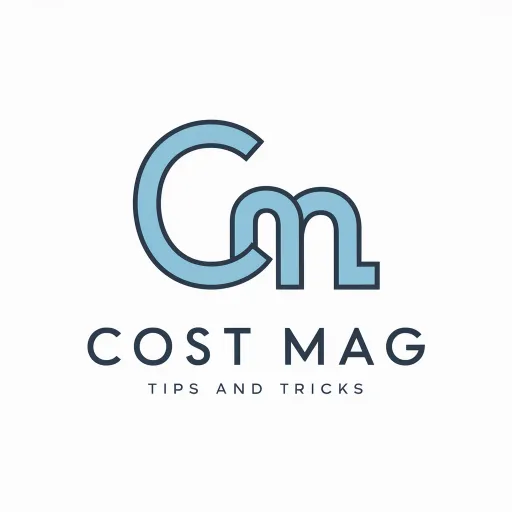An excavator is a powerful and versatile construction machine that plays a crucial role in various earthmoving and construction projects. Also, a common question asked by every people how much does an excavator cost? as a digger or hydraulic excavator, this heavy-duty piece of equipment is designed to efficiently excavate, dig, and move large quantities of soil, debris, rocks, or other materials with precision and speed.
Excavators are widely used in construction sites, mining operations, road building, forestry, demolition, and a range of other industries where digging and material handling are essential tasks.
These machines are characterized by their distinctive appearance, featuring a rotating house or cab mounted on a tracked or wheeled chassis. The most prominent component of an excavator is its hydraulic arm, which consists of a boom, stick (or dipper), and bucket attachment. The excavator’s operator controls these components using a series of hydraulic levers and pedals, allowing for precise and controlled movements.
Excavators come in various sizes and configurations, from compact mini-excavators suitable for tight spaces to massive crawler excavators used for large-scale excavation projects. They can be equipped with different types of attachments, such as buckets, hammers, grapples, and more, making them adaptable to a wide range of tasks.
The significance of excavators in construction and earthmoving cannot be overstated. They enable efficient digging, trenching, grading, and material handling, significantly speeding up the construction process while reducing labor requirements. Their versatility and power make them indispensable tools on construction sites worldwide, contributing to the development of infrastructure and various building projects.
cost of Acquiring a New Excavator
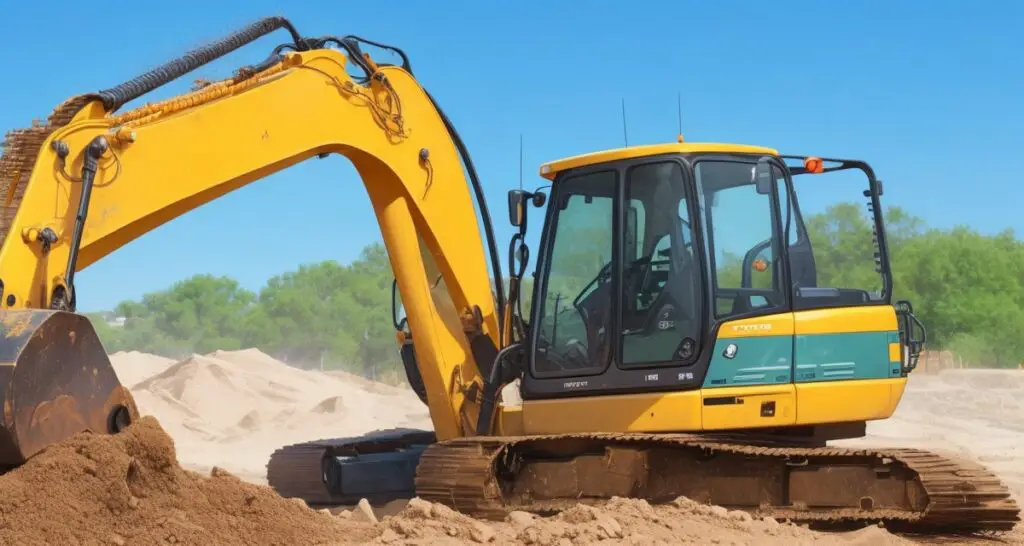
Acquiring a new excavator involves a range of pricing intricacies, each hinging on a multitude of factors. Here, we delve into a detailed breakdown of these factors and their corresponding price ranges, offering a comprehensive overview of the cost considerations associated with different types of excavators.
Compact Excavators (Weight: 10 to 15 Tons):
Compact excavators, ideal for projects in confined spaces, typically command a price range spanning from $75,000 to $150,000. The ultimate cost is subject to a range of variables, including the specific accessories and enhancements you opt for. These versatile machines are well-suited for tasks such as trenching, landscaping, and small-scale excavation.
Mid-Sized Excavators (Weight: 15 to 20 Metric Tons):
For those seeking a mid-sized excavator, weighing between 15 and 20 metric tons, the pricing landscape usually falls between $100,000 and $200,000. Nevertheless, this cost bracket is malleable and can shift based on factors such as brand, performance specifications, and the extent of customization required. Mid-sized excavators are often utilized in a wide array of construction and excavation projects, offering versatility and power.
Full-Sized Excavators (Weight: 30 to 40 Tons):
When considering a full-sized excavator, designed for substantial excavation tasks and larger-scale projects, the investment escalates. Expect the pricing to commence at $150,000, with potential for expenditures reaching as high as $500,000. The wide cost range hinges on a range of variables, including the manufacturer, performance capabilities, and the inclusion of specialized features and attachments. These robust machines are essential for heavy-duty excavation, mining, and large-scale construction projects.
The overall cost of a new excavator can also fluctuate based on brand reputation, technological advancements, fuel efficiency, and the inclusion of advanced features such as GPS systems, telematics, and operator comfort enhancements. When contemplating the purchase of an excavator, it’s crucial to carefully assess your specific project requirements and budget constraints to make an informed investment decision.
Exploring the cost of Pre-Owned Excavators
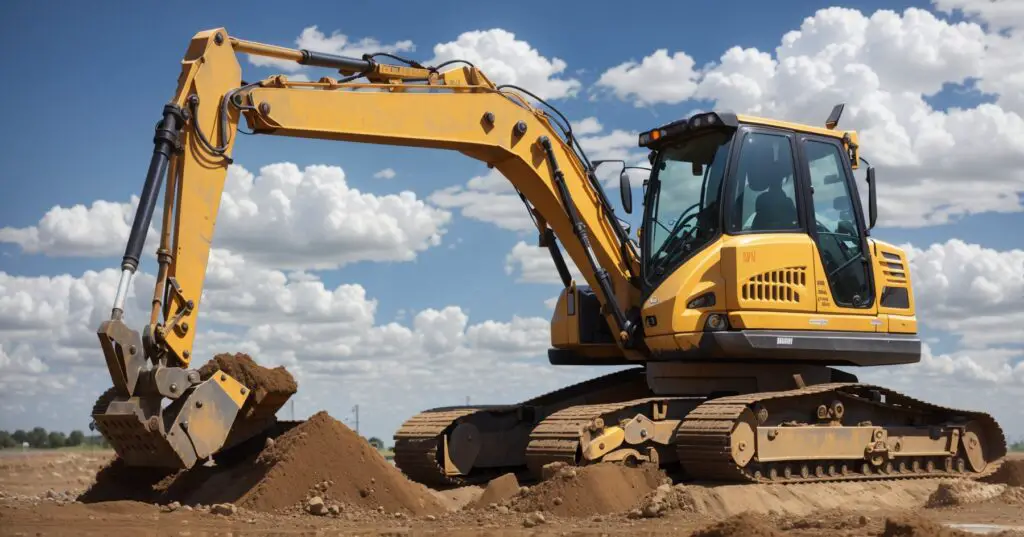
It’s well understood that excavators can represent a substantial investment, which is why considering the pre-owned market can be a prudent choice.
Pre-owned excavators frequently come with attractive price reductions, often ranging from 25% to 50% less than their original purchase price. Given that most new excavators command prices within the $100,000 to $500,000 range, opting for a used excavator can translate into a cost ranging between $50,000 and $250,000.
Another noteworthy factor influencing the pricing of used excavators is the total hours of operation.
- A medium-sized excavator, having logged approximately 2,500 hours of service over five years, typically falls within the $50,000 to $100,000 price bracket.
- If you are considering a mid-sized excavator with a two-year history, you can anticipate a price range spanning from $75,000 to $125,000, contingent upon its overall condition.
The total number of hours worked significantly influences the pricing dynamics of used excavators. For instance, a ten-year-old Cat 345B excavator with 4,000 hours of operation might be priced at approximately $200,000. Should the same machine have accrued more than 10,000 hours of usage, the price would experience a noticeable reduction, falling within the range of $75,000 to $125,000.
It’s advisable to consider factors such as the excavator’s maintenance history, overall condition, and any additional attachments or features when evaluating the suitability of a used excavator for your specific requirements. A well-informed decision ensures optimal value and performance for your investment.
Detailed Expense Analysis for Renting an Excavator
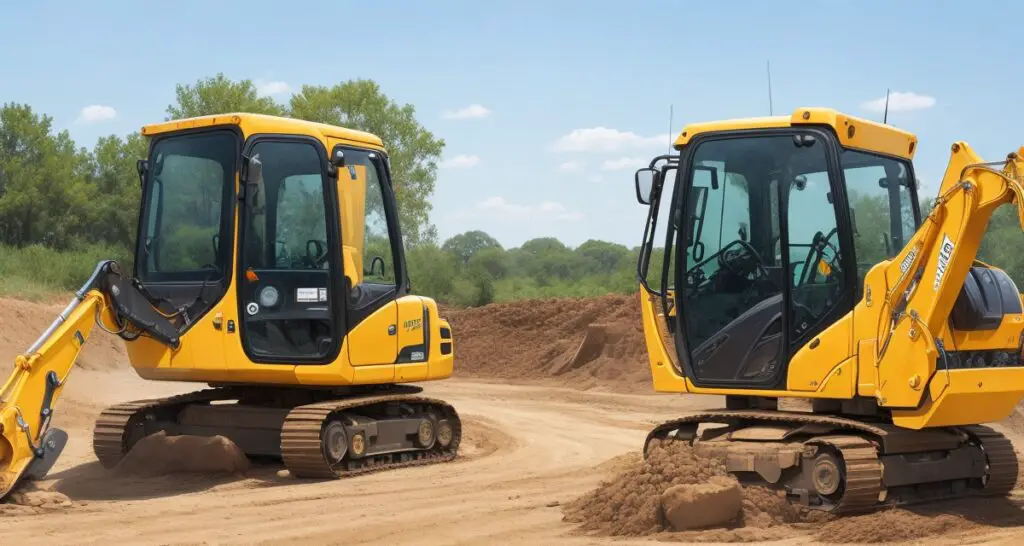
Renting an excavator can be a practical alternative to purchasing one, especially if your need is temporary. Let’s delve into a more comprehensive cost breakdown to help you make an informed decision.
The cost of renting an excavator typically ranges between $900 and $1,750 per day. Several factors can influence the final rental price, including:
Excavator Brand:
The brand of the excavator can significantly impact the rental rate. Well-known and reputable brands may come at a premium price.
Age of the Excavator:
Older excavators tend to be more affordable to rent, while newer models with advanced features may cost more.
Excavator Size:
The size of the excavator also plays a pivotal role in determining the rental fee. Smaller excavators are generally less expensive to rent than larger, more powerful ones.
Duration of Rental:
The length of time you need the excavator can affect the cost. Some rental companies offer discounts for longer rental periods, such as weekly or monthly rates.
Location:
Rental rates can vary based on your location and the availability of excavators in your area. Urban areas with high demand may have higher rates compared to rural locations.
Additional Attachments:
If you require specialized attachments or accessories for the excavator, these can add to the overall rental cost.
To get an accurate estimate for renting an excavator, it’s advisable to contact local rental companies and provide them with specific details about your project’s requirements. They can offer customized quotes based on your needs and the factors mentioned above, ensuring you have a clear understanding of the total cost involved.
Comparing Full-Size and Mini-Excavators
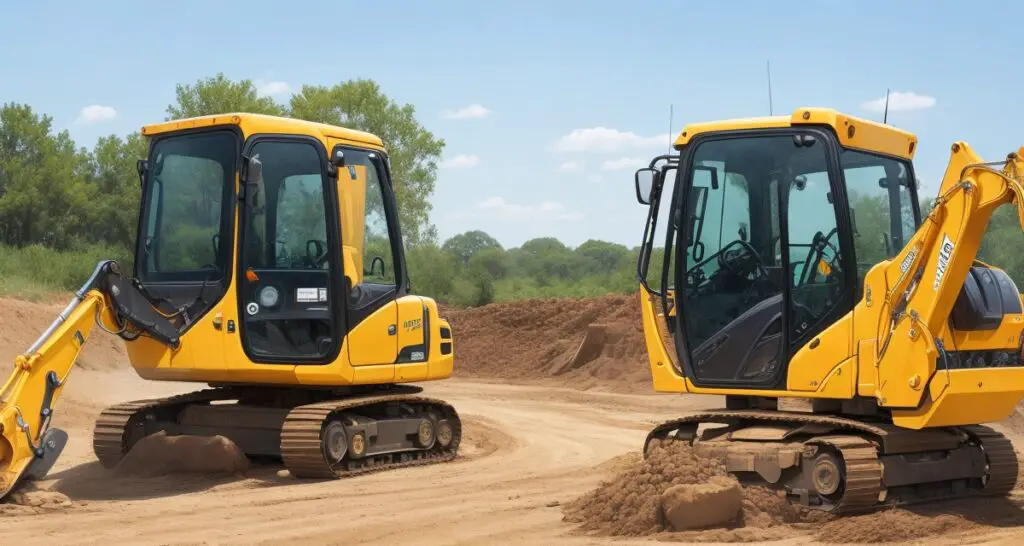
HOW MUCH DOES AN EXCAVATOR COST?
The world of excavators offers a rich array of choices, each designed to cater to the unique requirements of different projects. Some excavators are engineered for heavyweight tasks, while others excel in smaller-scale endeavors, such as efficient trenching, precise soil excavation, and delicate digging operations. The selection between a full-size excavator and a mini-excavator hinges on the specifics of your project. Let’s embark on an informative exploration of these two categories to gain a deeper understanding of their attributes.
Mini-Excavators:
Mini-excavators stand out primarily by their weight class, typically weighing less than seven metric tons.
These compact excavators, often referred to as compactors, prove exceptionally well-suited to modest job sites. Their nimbleness shines in confined spaces, rendering them invaluable assets for tasks like landscaping and the meticulous excavation of trenches for piping installation.
One notable hallmark of mini-excavators is their remarkable zero or near-zero tail swing, facilitating easy and damage-free operation in the midst of structures and around buildings.
Should your project locale involve an intricate network of underground gas lines and pipes, opting for a mini-excavator over larger digging equipment is not only a prudent choice but one that ensures both safety and efficiency.
Full-Size Excavators:
The full-size excavator category encompasses machines ranging from seven to 45 metric tons, making them a natural choice for substantial commercial construction endeavors.
These formidable excavators come equipped with substantial hauling capacity and commanding power, making them more than capable of handling the most demanding construction tasks. The majority of full-size excavators boast a versatile array of work tools suitable for a diverse range of projects.
Full-size excavators offer user-friendly operation, promising enhanced productivity on the job. It’s essential to bear in mind that their suitability may be compromised in confined workspaces, as their tail swing, reach, and dimensions can potentially pose challenges and risk damage to nearby structures.
Prevent Pitfalls When Acquiring a Pre-Owned Excavator
- Neglecting to Assess the Feasibility of Your Investment:
It’s crucial to evaluate whether the used excavator you intend to acquire can yield returns within a reasonable timeframe.
- Insufficiently Analyzing Suitability and Operating Costs:
Overlooking a thorough assessment of the excavator’s suitability for your needs and its operational costs can result in an unfavorable investment outcome.
- Focusing Solely on Price at the Expense of After-Sales Support:
While price matters, it’s equally important not to disregard the availability and quality of after-sales service when making your decision.
- Beware of Unrealistically Low Prices:
Excessively cheap used excavators often entail substantial maintenance expenses, ultimately leading to an unwise investment choice.
Factors to Consider Affecting the Overall Investment in Acquiring an Excavator
When acquiring heavy equipment like an excavator, it’s essential to recognize that the total expense encompasses more than just the initial purchase price. Taking these essential factors into account prior to your decision is advisable, as they can significantly impact your overall investment. Here, we provide insights into how these nuances can affect your overall cost.
These expenditures will vary depending on the specific machine you’re acquiring.
Transaction Fees:
Typically, when purchasing heavy machinery, a transaction fee is applicable. This fee, usually around 10% of the equipment’s price, is paid to the manufacturer or distributor. Exceptions exist, and in some instances, no transaction fee applies. Keep in mind that the fee percentage is based on the machine’s purchase price, so it’s essential to understand the exact amount before proceeding with the transaction.
Taxes:
Tax considerations are pivotal when acquiring heavy equipment. Sales tax rates vary based on local regulations, so it’s imperative to clarify the specific policies governing additional sales tax rates in your area. Take this aspect seriously, as it can potentially add a substantial amount to the overall cost, potentially totaling thousands of dollars.
Transportation:
The logistics of transporting your excavator from the point of purchase, whether it’s a port or another location, to your desired destination must be taken into account. Most governments restrict excavators from being driven on public highways, especially for extended distances. If you lack a suitable vehicle to safely transport the excavator, you’ll need to budget for hiring an appropriate truck and driver. This expense can be more significant than anticipated, particularly when dealing with long-distance transport from a seaport to your location. It’s essential to remember that transportation costs are your responsibility and should be factored in when calculating the overall purchase cost.
Financing:
We recommend exploring financing options when acquiring your new excavator. Financing can help you preserve cash for other business needs. Many companies and distributors offer financing plans to make your purchase more manageable. Alternatively, you can apply for a loan from a bank or financial institution. Be mindful that interest rates vary considerably between financial institutions, so you should select one based on your creditworthiness and asset status. Ensure you include this cost in your purchase planning, especially when considering the acquisition of a new excavator. In some cases, it may also apply to used excavators.
Additional Excavator Attachments and Their Associated Costs
Excavators, regardless of their size or configuration, often require additional accessories to optimize their functionality. The most commonly used attachments include augers, buckets, compactors, couplers, grapples, hammers, rippers, and thumbs. Each of these attachments comes with a specific cost, which can impact your overall investment.
Augers:
Augers are invaluable for tasks like tree planting, shrubbery work, footing excavation, and post-hole digging. The cost of an auger typically falls within the range of $1,000 to $3,000, although it may be influenced by the brand and type of excavator you possess.
Buckets:
Buckets are essential digging attachments that feature multiple teeth and are affixed to the excavator’s arm. Different bucket types, varying in width and design, are required for different tasks. These buckets can cost approximately $1,400 for a 24″ size, $1,600 for a 30″ size, and $1,800 for a 36″ size.
Compactors:
Compactors are versatile attachments used for various compaction operations. Depending on your project requirements, you may need compaction wheels, vibratory drum compactors, or vibratory plate compactors. The cost of compactors ranges from approximately $3,000 to $6,000, depending on their size.
Couplers – Excavators:
Excavator quick coupler systems facilitate the swift and effortless exchange of work tools. Two types are available: hydraulic and spring-loaded couplers. Spring-loaded quick couplers are priced between $225 and $2,500, while hydraulic couplers fall within the range of $5,700 to $6,700.
Grapples:
For projects involving material handling, grapples are indispensable excavator attachments. Grapples are employed for tasks such as material picking, moving, and sorting. The type of grapple required depends on the specific project, such as land clearing, forestry, scrap handling, rock sorting, or demolition. Grapple costs vary but typically start at $6,000.
Rakes:
Rakes are essential for site preparation, brush piling, and land clearing projects. These attachments allow for efficient clearing of large areas of land. The cost of an excavator rake typically ranges from $780 to $800.
Multi-Processors:
Multi-processors are versatile tools that enhance an excavator’s versatility by enabling the use of interchangeable jaws. Prices for excavator multi-purpose processors start at $1,000.
Hammers:
Excavator hammers are attachments used for breaking down complex materials, rocks, and concrete. The size of the hammer required depends on the excavator’s specifications. Excavator hammer costs typically range from $4,000 to $8,500.
Rippers:
Rippers are essential accessories used alongside excavators for construction projects, especially excavation and open-pit work. These attachments come in various sizes, from 19 inches to as large as 51 inches. Depending on the size of the excavator ripper needed, costs can start at $2,000 and go higher.
Thumbs:
Excavator thumbs are available in different sizes, with the appropriate size determined by your excavator’s type and dimensions. For example, an Mt618 mini-excavator thumb is designed to fit machines ranging from 490 to 4,000 lbs. Thumb costs vary based on the model and size, with prices starting as low as $700 for a mini-excavator thumb.
These attachments enhance the capabilities of your excavator, allowing it to excel in various tasks. Consider your project requirements and choose the appropriate accessories to optimize your excavator’s performance.
Conclusion:
The cost of an excavator varies considerably based on several factors, including its size, brand, model, age, features, and attachments. Basic compact excavators may start at around $20,000 to $50,000, while larger, more advanced models can range from $100,000 to $500,000 or more.
Ongoing expenses such as fuel, maintenance, insurance, and financing costs should be factored in when considering the total cost of ownership. Whether you choose a new or used excavator and explore financing options, carefully assessing your specific needs and budget is essential when determining how much an excavator will cost for your particular project or business.
FAQs
How much does a basic excavator cost?
The cost of a basic excavator can vary significantly based on its size and features. Smaller, compact excavators may start at around $20,000 to $50,000, while larger models can range from $100,000 to $500,000 or more.
What factors influence the price of an excavator?
Several factors affect excavator prices, including the brand, model, size, age, attachments, and additional features such as cab comfort and technology. Newer, more advanced excavators tend to be more expensive.
Are there ongoing costs associated with owning an excavator?
Yes, owning an excavator comes with ongoing expenses, including fuel, maintenance, insurance, and potentially financing costs if you purchase through a loan or lease. These costs can vary depending on usage and maintenance requirements.
Can I save money by buying a used excavator?
Purchasing a used excavator can be a cost-effective option. Used excavators typically come at a lower upfront price compared to new ones. You should carefully assess the condition and maintenance history of a used excavator to ensure it meets your needs.
Are there financing options available for buying an excavator?
Yes, financing options, such as loans and leases, are often available for purchasing excavators. Many dealers and financial institutions offer financing to help spread the cost over time, making it more manageable for businesses.
